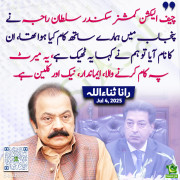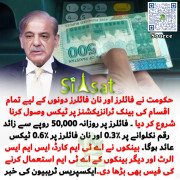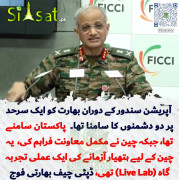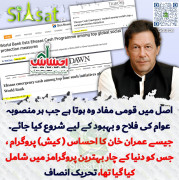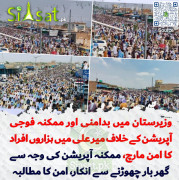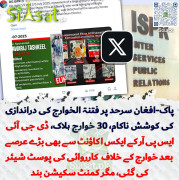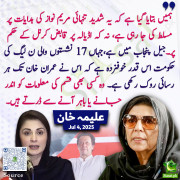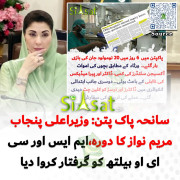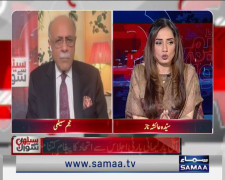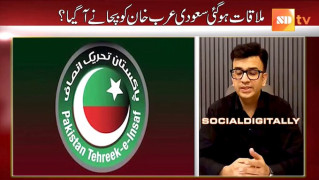unmet47
Voter (50+ posts)
Did Pakistan Lose the 1965 War?- A Reply To Dawn's Article
Unfortunately just before the eve of 6th September, Dawn posted a statement from some Dr. Akbar S. Zaidi, and turned it into a Headline. This individual claimed that Pakistan had lost "terribly" in the 1965 war...
Lets analyse from neutral reports of International newspapers, journalists, on-ground neutral observers and investigators who wrote at the time of war or just after it ended about what were Pakistan's Achievements in the 1965 Indo-Pak war:
1.

2. Newsweek magazine praised the Pakistani military's ability to hold off the much larger Indian Army and wrote: "By just the end of the week, in fact, it was clear that the Pakistanis were more than holding their own" (Newsweek 20th September 1965)
3. "Pakistan claims to have destroyed something like 1/3rd the Indian Air Force, and foreign observers, who are in a position to know say that Pakistani pilots have claimed even higher kills than this; but the Pakistani Air Force are being scrupulously honest in evaluating these claims. They are crediting Pakistan Air Force only those killings that can be checked from other sources."
(Roy Meloni, American Broadcasting Corporation September 15, 1965)
4. "Pakistan has been able to gain complete command of the air...India is being SOUNDLY BEATEN by a nation which it outnumbered by a 4 and a half to 1 in population and 3 to 1 in size of armed forces" (Sunday Times- London- issue: September 19 , 1965)
5. "Outnumbered by three-to-one they (Pakistani soldiers) beat the Indians to a standstill" (Daily Express- London 24th September 1965-correspondent: Donald Seaman)
6. "For the PAF, the 1965 war was as climatic as the Israeli victory over the Arabs in 1967. A further similarity was that Indian air power had an approximately 5:1 numerical superiority at the start of the conflict. Unlike the Middle East conflict, the Pakistani air victory was achieved to a large degree by air-to-air combat rather than on ground. But it was as absolute as that attained by Israel. (USA Aviation and Space Technology 1968 issue)
7. "The air war lasted two weeks and the Pakistanis scored a three-to-one kill ratio, knocking out 102 Russian-made Indian jets and losing thirty-four airplanes of their own. I'm certain about the figures because I went out several times a day in a chopper and counted the wrecks below." "They were really good, aggressive dogfighters and proficient in gunnery and air combat tactics. I was damn impressed. Those guys just lived and breathed flying. "
(General (Retd.) Chuck Yeager (USAF) , Book: Yeager, the Autobiography).
8. "Pakistan morally and even physically had won the air-battle against the Indians. The Indians had no sense of purpose. The Pakistanis were defending their own country and willingly taking greater risk." (Peter Preston - The Guardian 24th September 1965 issue)
9. "How you were overpowering the Indians despite being in a small number. " (Question asked by on-ground reporting correspondent of Times Magazine Louis Kanar issue : 22nd September 1965)
10. "I want to bring it on record that India is claiming victory but on ground there is no evidence to support Indian claims. What I see is only destroyed Indian tanks and huge logistic support units rolling towards their forward area. During my long journalistic career spanning over two decades, I have never seen a group of such confident individuals as the victorious Pakistani soldiers fighting against Indians". - (Roy Meloni, American Broadcasting Corporation September 15, 1965)
11. "India brought up the bulk of its armoured forces in an effort to force a decision but the Pakistan Armed Forces stood like an impregnable wall and dealt a heavy punishment to the enemy columns." (Indonesian Herald 15th September 1965).
12. " There is a smell of death in the burning Pakistan sun. For it was here that India's attacking forces came to a dead stop..During the night they threw in every reinforcement they could find. But wave after wave of attacks were repulsed by the Pakistanis" (Daily Mirror- London issue 15th September 1965)
13. "In the air, it was much the same story €œ Indian quantity and Pakistan quality... In the short run, Pakistan's small, highly trained army is more than a match for the Indians. (The Time Weekly September 17, 1965)
14. "India's comparatively disappointing military performance so far must be ascribed in part to the peculiar disadvantages of its army. The first of these goes back to the long period (which ended in 1952) when Mr. Krishna Menon was Minister of Defence. Menon was not militarily inclinded.." (Evening Standard; London, September 11 1965)
15. " The First Indian regiment that found itself face to face with the Pakistanis didn't get clobbered. They just turned and ran, leaving all of their equipment artillery supplies and even extra clothing and supplies behind. ("Top of the News" Washington, September 10, 1965)
16. Though India has a population of 400 million people compared to Pakistan with only a hundred million, Pakistan has faced the agression of India bravely and has achieved brilliant victories. (Utusan Melayu, Kuala Lumpur, September 22, 1965)
17.

Some foreign books authored DECADES later try to contradict the international on-ground observers, journalists and media reporting during and after the war. These books which are selectively quoted on the page of Wikipedia are used by Indians and Liberals alike to show that India had the upper hand in the 1965 war. But even these books (authored decades after the war with no research done on the what the on-ground Neutral observers had written in DETAIL about the war) agree that Pakistan had the upper hand in aerial warfare.
"Pakistan Air Force did well in the conflict (1965) and probably had the edge" (Werrell, Kenneth (2013). Sabres Over MiG Alley: The F-86 and the Battle for Air Superiority in Korea. Naval Institute Press. p. 188)
"During the last days of the 1965 war Pakistani aircraft flew over Indian cities and airbases without any response from the opposing side. At the end of the war, India had lost 110 aircraft with 19 damaged, not including those destroyed on the ground at night, against a loss of 16 PAF planes" (John Pike -Pakistan Air Force Combat Experience" http://www.globalsecurity.org/military/world/pakistan/air-force-combat.htm)
Other than that some books authored by Indians and Confessions by Indian Army Generals are available, where they clearly admit of Pakistan's upper hand in the war. I'll post these below:
1. Even during the war the Indian Newspaper TOI (Times Of India) admitted to Pakistan's strong defense:
"It is clear from the Fury with which the enemy (Pakistan) is fighting at all fronts that it has not been easy for the Indian Army to advance into Pakistan territory " (TOI- Bombay September 16 1965)
2. Lt. Gen Depinder Singh of the Indian army admitted Indian army's drawbacks during the 1965 war

3. Lt. Gen Harbaksh Singh accepted Pak military superiority over the Indian army in 1965 war.

4. In the book "1965 War, the Inside Story: Defence Minister Y.B. Chavan's Diary of India" . R. D. Pradhan provided an interesting day-to-day account of Indian Minister's diary during the 1965 war. A few excerpts:
"...a major battle the west of the Beas would end in the destruction of the Indian Army and thereafter allow the enemy (Pakistani) forces to push to the gates of Delhi without much resistance,..."
"Pakistan Defense forces counter attacked the intruding Indian Military and the General was fired upon on Sept 6, 1965, "he ran away,"
"Had a very hard day on all fronts...we are required to withdraw in Kasur area. COAS was somewhat uncertain of himself"
(read book online: https://books.google.com.pk/books?i...ult&ct=result&redir_esc=y#v=onepage&q&f=false)
Some Indians and Liberals claim that Pakistan initiated the war to get Kashmir but failed, thus war was a complete failure for Pakistan. I have a few things to say in this regard;
Firstly Pakistan initiated a limited offensive in the "disputed territory" of Kashmir. Similar offensives have been launched by India previously (e.g in Siachen) without Pakistan starting any full-fledged war. The thing is India initiated a full-fledged war by attacking "Pakistan Proper" and its aim was to OCCUPY LAHORE.
Later India had to give "apologies" and "explanations" to its people over failure to occupy Lahore. India took a U-Turn altogether and said it never actually intended to occupy Lahore! Here are 2 news cuttings
1st one shows Indian army's aim of occupying Lahore, second one depicting the U-turn it took after it failed:

This "U-Turn/ apology" by the Indian army was even criticised within India:
"Why did a soldier of the position experience of General chaudhiri put forward this extra-ordinary plea?...He must have been influenced€by the impulse that all soldiers have to justify a campaign which has NOT gone according to plans by adducing reasons which are AFTERTHOUGHTS "
(Veteran Ind, Commander NI)
In his bid to explain India's inability to capture Lahore/Sialkot, the Indian general was quoted to have admitted the following:
"General Chaudhiri had made it quite clear that it was never the objective of the Indian army to occupy Lahore or Sialkot. Both places (Lahore and Sialkot) were well defended and entry into either would have achieved very little, at heavy costs of men and material" (The Statesman -Delhi)
Thus as all neutral reporting reveals Pakistan certainly had the upper hand over India in the 1965 war. The Pakistani Army occupied Indian areas such as Khem Kharan, Rajasthan; including Munabao and its Railway station (pics available). India even feared losing Amritsar (as claimed by the Daily Telegram in 1965 and confirmed by the Indian Express in January 30, 2015).
Also International Observers claim that Pakistan was about to launch major counter-attacks against India, just 6 hours before the Ceasefire, but they had to be halted because of it! I quote the Observer Donald Seaman who himself went to observe casualties/damages on ground. After describing the damages on both sides in the Sialkot front, he went on to say
"Outnumbered 3 to 1 they (Pakistanis) beat the Indians to a standstill, and were about to mount a Counter-Attack in the last 6 hours before the Cease-Fire before they were stopped on Political Grounds"..( Donald Seaman "Daily Express" -London 24th September 1965).
Unfortunately just before the eve of 6th September, Dawn posted a statement from some Dr. Akbar S. Zaidi, and turned it into a Headline. This individual claimed that Pakistan had lost "terribly" in the 1965 war...
Lets analyse from neutral reports of International newspapers, journalists, on-ground neutral observers and investigators who wrote at the time of war or just after it ended about what were Pakistan's Achievements in the 1965 Indo-Pak war:
1.

2. Newsweek magazine praised the Pakistani military's ability to hold off the much larger Indian Army and wrote: "By just the end of the week, in fact, it was clear that the Pakistanis were more than holding their own" (Newsweek 20th September 1965)
3. "Pakistan claims to have destroyed something like 1/3rd the Indian Air Force, and foreign observers, who are in a position to know say that Pakistani pilots have claimed even higher kills than this; but the Pakistani Air Force are being scrupulously honest in evaluating these claims. They are crediting Pakistan Air Force only those killings that can be checked from other sources."
(Roy Meloni, American Broadcasting Corporation September 15, 1965)
4. "Pakistan has been able to gain complete command of the air...India is being SOUNDLY BEATEN by a nation which it outnumbered by a 4 and a half to 1 in population and 3 to 1 in size of armed forces" (Sunday Times- London- issue: September 19 , 1965)
5. "Outnumbered by three-to-one they (Pakistani soldiers) beat the Indians to a standstill" (Daily Express- London 24th September 1965-correspondent: Donald Seaman)
6. "For the PAF, the 1965 war was as climatic as the Israeli victory over the Arabs in 1967. A further similarity was that Indian air power had an approximately 5:1 numerical superiority at the start of the conflict. Unlike the Middle East conflict, the Pakistani air victory was achieved to a large degree by air-to-air combat rather than on ground. But it was as absolute as that attained by Israel. (USA Aviation and Space Technology 1968 issue)
7. "The air war lasted two weeks and the Pakistanis scored a three-to-one kill ratio, knocking out 102 Russian-made Indian jets and losing thirty-four airplanes of their own. I'm certain about the figures because I went out several times a day in a chopper and counted the wrecks below." "They were really good, aggressive dogfighters and proficient in gunnery and air combat tactics. I was damn impressed. Those guys just lived and breathed flying. "
(General (Retd.) Chuck Yeager (USAF) , Book: Yeager, the Autobiography).
8. "Pakistan morally and even physically had won the air-battle against the Indians. The Indians had no sense of purpose. The Pakistanis were defending their own country and willingly taking greater risk." (Peter Preston - The Guardian 24th September 1965 issue)
9. "How you were overpowering the Indians despite being in a small number. " (Question asked by on-ground reporting correspondent of Times Magazine Louis Kanar issue : 22nd September 1965)
10. "I want to bring it on record that India is claiming victory but on ground there is no evidence to support Indian claims. What I see is only destroyed Indian tanks and huge logistic support units rolling towards their forward area. During my long journalistic career spanning over two decades, I have never seen a group of such confident individuals as the victorious Pakistani soldiers fighting against Indians". - (Roy Meloni, American Broadcasting Corporation September 15, 1965)
11. "India brought up the bulk of its armoured forces in an effort to force a decision but the Pakistan Armed Forces stood like an impregnable wall and dealt a heavy punishment to the enemy columns." (Indonesian Herald 15th September 1965).
12. " There is a smell of death in the burning Pakistan sun. For it was here that India's attacking forces came to a dead stop..During the night they threw in every reinforcement they could find. But wave after wave of attacks were repulsed by the Pakistanis" (Daily Mirror- London issue 15th September 1965)
13. "In the air, it was much the same story €œ Indian quantity and Pakistan quality... In the short run, Pakistan's small, highly trained army is more than a match for the Indians. (The Time Weekly September 17, 1965)
14. "India's comparatively disappointing military performance so far must be ascribed in part to the peculiar disadvantages of its army. The first of these goes back to the long period (which ended in 1952) when Mr. Krishna Menon was Minister of Defence. Menon was not militarily inclinded.." (Evening Standard; London, September 11 1965)
15. " The First Indian regiment that found itself face to face with the Pakistanis didn't get clobbered. They just turned and ran, leaving all of their equipment artillery supplies and even extra clothing and supplies behind. ("Top of the News" Washington, September 10, 1965)
16. Though India has a population of 400 million people compared to Pakistan with only a hundred million, Pakistan has faced the agression of India bravely and has achieved brilliant victories. (Utusan Melayu, Kuala Lumpur, September 22, 1965)
17.

Some foreign books authored DECADES later try to contradict the international on-ground observers, journalists and media reporting during and after the war. These books which are selectively quoted on the page of Wikipedia are used by Indians and Liberals alike to show that India had the upper hand in the 1965 war. But even these books (authored decades after the war with no research done on the what the on-ground Neutral observers had written in DETAIL about the war) agree that Pakistan had the upper hand in aerial warfare.
"Pakistan Air Force did well in the conflict (1965) and probably had the edge" (Werrell, Kenneth (2013). Sabres Over MiG Alley: The F-86 and the Battle for Air Superiority in Korea. Naval Institute Press. p. 188)
"During the last days of the 1965 war Pakistani aircraft flew over Indian cities and airbases without any response from the opposing side. At the end of the war, India had lost 110 aircraft with 19 damaged, not including those destroyed on the ground at night, against a loss of 16 PAF planes" (John Pike -Pakistan Air Force Combat Experience" http://www.globalsecurity.org/military/world/pakistan/air-force-combat.htm)
Other than that some books authored by Indians and Confessions by Indian Army Generals are available, where they clearly admit of Pakistan's upper hand in the war. I'll post these below:
1. Even during the war the Indian Newspaper TOI (Times Of India) admitted to Pakistan's strong defense:
"It is clear from the Fury with which the enemy (Pakistan) is fighting at all fronts that it has not been easy for the Indian Army to advance into Pakistan territory " (TOI- Bombay September 16 1965)
2. Lt. Gen Depinder Singh of the Indian army admitted Indian army's drawbacks during the 1965 war

3. Lt. Gen Harbaksh Singh accepted Pak military superiority over the Indian army in 1965 war.

4. In the book "1965 War, the Inside Story: Defence Minister Y.B. Chavan's Diary of India" . R. D. Pradhan provided an interesting day-to-day account of Indian Minister's diary during the 1965 war. A few excerpts:
"...a major battle the west of the Beas would end in the destruction of the Indian Army and thereafter allow the enemy (Pakistani) forces to push to the gates of Delhi without much resistance,..."
"Pakistan Defense forces counter attacked the intruding Indian Military and the General was fired upon on Sept 6, 1965, "he ran away,"
"Had a very hard day on all fronts...we are required to withdraw in Kasur area. COAS was somewhat uncertain of himself"
(read book online: https://books.google.com.pk/books?i...ult&ct=result&redir_esc=y#v=onepage&q&f=false)
Some Indians and Liberals claim that Pakistan initiated the war to get Kashmir but failed, thus war was a complete failure for Pakistan. I have a few things to say in this regard;
Firstly Pakistan initiated a limited offensive in the "disputed territory" of Kashmir. Similar offensives have been launched by India previously (e.g in Siachen) without Pakistan starting any full-fledged war. The thing is India initiated a full-fledged war by attacking "Pakistan Proper" and its aim was to OCCUPY LAHORE.
Later India had to give "apologies" and "explanations" to its people over failure to occupy Lahore. India took a U-Turn altogether and said it never actually intended to occupy Lahore! Here are 2 news cuttings
1st one shows Indian army's aim of occupying Lahore, second one depicting the U-turn it took after it failed:

This "U-Turn/ apology" by the Indian army was even criticised within India:
"Why did a soldier of the position experience of General chaudhiri put forward this extra-ordinary plea?...He must have been influenced€by the impulse that all soldiers have to justify a campaign which has NOT gone according to plans by adducing reasons which are AFTERTHOUGHTS "
(Veteran Ind, Commander NI)
In his bid to explain India's inability to capture Lahore/Sialkot, the Indian general was quoted to have admitted the following:
"General Chaudhiri had made it quite clear that it was never the objective of the Indian army to occupy Lahore or Sialkot. Both places (Lahore and Sialkot) were well defended and entry into either would have achieved very little, at heavy costs of men and material" (The Statesman -Delhi)
Thus as all neutral reporting reveals Pakistan certainly had the upper hand over India in the 1965 war. The Pakistani Army occupied Indian areas such as Khem Kharan, Rajasthan; including Munabao and its Railway station (pics available). India even feared losing Amritsar (as claimed by the Daily Telegram in 1965 and confirmed by the Indian Express in January 30, 2015).
Also International Observers claim that Pakistan was about to launch major counter-attacks against India, just 6 hours before the Ceasefire, but they had to be halted because of it! I quote the Observer Donald Seaman who himself went to observe casualties/damages on ground. After describing the damages on both sides in the Sialkot front, he went on to say
"Outnumbered 3 to 1 they (Pakistanis) beat the Indians to a standstill, and were about to mount a Counter-Attack in the last 6 hours before the Cease-Fire before they were stopped on Political Grounds"..( Donald Seaman "Daily Express" -London 24th September 1965).
Last edited:



